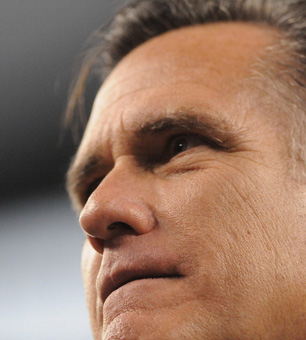On Wednesday, President Obama and Mitt Romney will face a number of carefully crafted questions on domestic policy at the University of Denver debate. As voters are overwhelmingly concerned about the economy this year, the bulk of the debate is likely to be spent on the candidates’ plans for taxes, unemployment, and deficit reduction. This focus on the economy, however, blinkers voters from issues that both Obama and Romney have so far ignored. Should debate moderator Jim Lehrer want to catch them off guard tomorrow, he could pose one of these questions:
How will you reconcile the federal government’s War on Drugs with state-level legalization efforts?
Both candidates have laughed off questions about marijuana legalization, even as Colorado and Washington prepare to vote on state-level legalization on Election Day. Medical marijuana is already legal in 17 states and DC, and Massachusetts and Arkansas will vote on whether to join them in November. Several cities, including Denver, Chicago and New York have decriminalized petty possession of marijuana. However, the federal government has actively targeted dispensaries in compliance with state law, in spite of Attorney General Eric Holder’s 2009 promise to leave them alone. The war on drugs has swelled the US prison population to the largest in the world, while failing to reduce drug use. Moreover, its disproportionate impact on communities of color led the NAACP to endorse Colorado’s marijuana legalization initiative. The momentum behind legalization on the local level promises to have major implications for federal drug policy in coming years.
In what cases is it acceptable to conduct warrantless surveillance of citizens?
In September, the House voted to reauthorize George W. Bush’s Foreign Intelligence Surveillance Amendments Act (FISA). FISA grants the executive branch extensive spying powers on American citizens abroad and at home. The Obama administration unequivocally supports FISA renewal — and the Justice Department is making good use of its provisions. Records recently obtained by the ACLU show a huge spike in DOJ’s warrantless surveillance of telephone, email and Internet communications since 2010. A Romney administration would likely maintain or worsen this trend; in 2005, he called for monitoring and wire-tapping Masaschusetts mosques and foreign students.
What specific measures would you support to reduce national gun violence?
After Minneapolis became the site of this year’s sixth mass shooting last Friday, Mayors Against Illegal Guns released an ad in which a survivor of the Aurora movie theater shooting implored Obama and Romney to release a plan to tackle gun violence, which is expected to kill 48,000 Americans in the next four years. After the Aurora shooting, both candidates declined to talk in specifics. Obama called for “common sense” gun controls but immediately backed away from introducing any new measures, while Romney claimed gun control would not have prevented the “unspeakable tragedy.” The gun rights industry, led by the National Rifle Association, has spent $17.4 million in lobbying since 2009 and millions more in campaign donations to ensure the quick death of any gun regulation bill introduced in Congress.
What would you do to reduce child poverty in your first 100 days?
Poverty is a leading cause of America’s infant mortality rate, which is significantly higher than every other wealthy nation. 46 million people, including 16 million children, stayed below the poverty line from 2010 to 2011, while income inequality grew for the first time since 1993. Though Republicans and Democrats have both defined the middle class as households making up to $250,000 a year, lower middle class incomes actually hover around $20,000-$38,000 and are rapidly bottoming out. Meanwhile, a third of Americans identify themselves as lower class or lower middle class, up from 25 percent four years ago. Despite the urgency of this problem, a recent study found that campaign reporters almost studiously ignore the topic, dedicating less than .2 percent of their coverage to poverty. As the political influence of the poor is virtually nonexistent, it is no surprise that media and politicians alike have avoided discussing their plight.
How will you combat America’s obesity epidemic?
81 percent of Americans think obesity is an “extremely serious” or “very serious” social problem — and they’re right. Most adults in all 50 states are now obese or overweight. First Lady Michelle Obama’s “Let’s Move” campaign is one way the administration is tackling the problem. However, Mrs. Obama refocused the initiative to promote exercise over diet change after taking heat for her criticism of processed food producers. Big Food’s influence has grown to staggering proportions; Congress declared pizza a vegetable this year after intense lobbying by the industry, while the USDA was forced to apologize for an internal Meatless Monday initiative after the beef industry attacked them. The new president will contend with these industry forces immediately, as the Farm Bill is one of the first issues lawmakers will tackle after the election. Given Romney’s close relationship with the industry, he is likely to back the House bill, which guts nutrition assistance, provides generous subsidies for Big Agriculture crops, and eliminatesany meaningful regulation of genetically modified crops and pesticides.
Press freedom is under attack
As Trump cracks down on political speech, independent media is increasingly necessary.
Truthout produces reporting you won’t see in the mainstream: journalism from the frontlines of global conflict, interviews with grassroots movement leaders, high-quality legal analysis and more.
Our work is possible thanks to reader support. Help Truthout catalyze change and social justice — make a tax-deductible monthly or one-time donation today.
